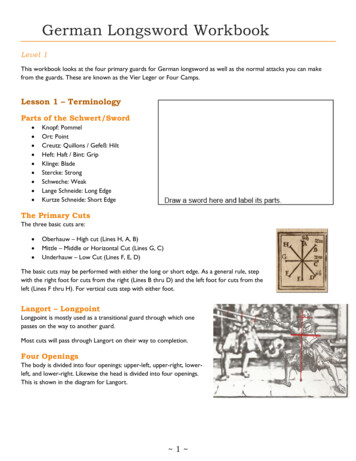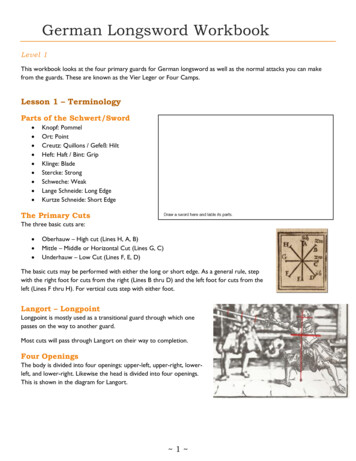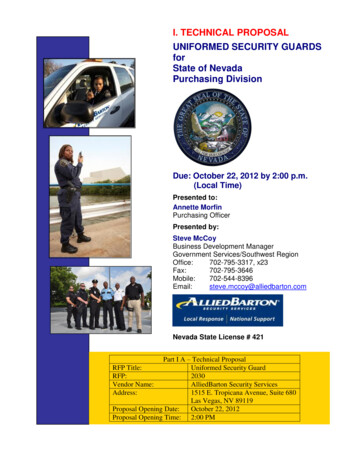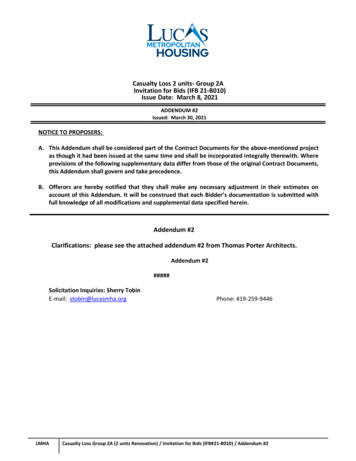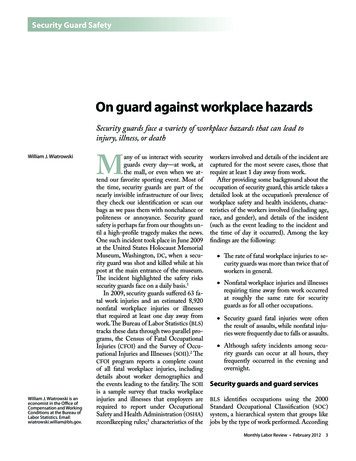
Transcription
Copyright The Author(s), 2022. Published by Cambridge University Press for The American Society of International Law.This is an Open Access article, distributed under the terms of the Creative Commons Attribution licence (https://creativecommons.org/licenses/by/4.0/), which permits unrestricted re-use, distribution, and reproduction in any medium,provided the original work is properly cited.doi:10.1017/ajil.2022.20WHO GUARDS THE “GUARDIANS OF THE SYSTEM”? THE ROLE OF THESECRETARIAT IN WTO DISPUTE SETTLEMENTBy Joost Pauwelyn* and Krzysztof Pelc**ABSTRACTFor all the attention paid to the panelists and Appellate Body of the World TradeOrganization (WTO), the Secretariat plays an overlooked and increasingly important rolein the dispute settlement mechanism (DSM), including in selecting panelists, writing “issuepapers” for adjudicators, providing economic expert advice, participating in internal deliberations, and drafting actual rulings. This Article argues that, given these functions, the DSM isbetter understood to be a sui generis administrative review process than it is a “World TradeCourt.”I. INTRODUCTIONFrom the moment of its inception in 1995, the World Trade Organization’s (WTO)Dispute Settlement Understanding (DSU) has functioned as a first-rate scholarly specimen, serving the purposes of the various academic tribes studying it. Legal scholarsheld it up as the consummation of the ambitions of public international law: an independent tribunal with compulsory jurisdiction, tasked with adjudicating legal disagreementsbetween sovereign states, and generating its own expansive jurisprudence.1 Political scientists looking for cases of successful self-binding by democracies saw in it the rational delegation of power by sovereigns to an international body: a means of managing thedemands of domestic interest groups, while defusing interstate power politics. 2Economists recognized it as a means of dealing with a necessarily incomplete contract,* Professor of international law as well as head of the International Law Department at the Graduate Institute ofInternational and Development Studies in Geneva, Switzerland and co-director of the Institute’s Centre for Tradeand Economic Integration.** Professor and William Dawson Scholar at McGill University, Canada.1Ernst-Ulrich Petersmann, The Dispute Settlement System of the World Trade Organization and the Evolution ofthe GATT Dispute Settlement System Since 1948, 31 COMMON MKT. L. REV. 1157 (1994); Peter van den Bossche,From Afterthought to Centerpiece: The WTO Appellate Body and Its Rise to Prominence in the World Trading System,in THE WTO AT TEN: THE CONTRIBUTION OF THE DISPUTE SETTLEMENT SYSTEM (Giorgio Sacerdoti, Alan Yanovich& Jan Bohanes eds., 2006).2Michael Gilligan, Leslie Johns & B. Peter Rosendorff, Strengthening International Courts and the EarlySettlement of Disputes, 54 J. CONFLICT RESOL. 5 (2010); CHRISTINA L. DAVIS, WHY ADJUDICATE?: ENFORCINGTRADE RULES IN THE WTO (2012).534https://doi.org/10.1017/ajil.2022.20 Published online by Cambridge University Press
2022THE ROLE OF THE SECRETARIAT IN WTO DISPUTE SETTLEMENT535and rendering credible the threat of retaliation in a way that increased the odds of cooperation between trade partners.3In this Article, we present the WTO’s “crown jewel” in a new light, by looking to thelargely overlooked role played by its Secretariat, as compared to that of the appointed adjudicators themselves. Drawing on archival and anecdotal evidence, and on a set of recentempirical findings, we argue that the permanent staff of the WTO’s Secretariat has playeda more significant role within the organization’s development than the staff of any comparablestate-to-state tribunal. Looking to the history of the institution, we show how this was partlyby design: following a series of problematic rulings in the 1980s, member states construed theSecretariat’s Legal Affairs Division as a body tasked with holding “rogue” panels in check.Rather than an agent of adjudicators, akin to the role staff traditionally play in other tribunals,the WTO Secretariat was an agent of governments from its beginnings, designed to impartlegal accuracy and institutional memory on diplomat-adjudicators, and guard the systemagainst the risk of egregious rulings. Yet as we suggest, the agent may have outgrown thatinitial mandate, owing to a number of unanticipated structural features which led, overtime, to an increasing shift of power and responsibilities from adjudicators to Secretariatstaff, in a way that governments could never have anticipated when they first established aLegal Affairs Division staffed by three lawyers back in the 1980s. Now counting morethan ninety staff, of whom as many as a dozen may be assigned to a given dispute, theSecretariat’s experience dwarfs that of the adjudicators they are tasked with “assisting.” Aswe explain, this gap in expertise only keeps increasing with the accrual of WTO jurisprudence: permanent staff in situ in Geneva accumulate knowledge that adjudicators employedpart time, and who most often fly in for hearings, cannot hope to match.Whether intended or unanticipated, the WTO Secretariat’s expansive role holds considerable implications both for practice and theory. We argue that it has left the organizationopen to concerns over (external) legitimacy and a lack of transparency and accountability.It has also affected legal outcomes in several respects, from increasing reliance on precedentand obiter dicta to elongating proceedings and expanding the scope of rulings. These effectsare especially notable, since they coincide with the chief criticisms recently directed at thedispute settlement system by the United States and other members. In this sense, theinstitution’s current impasse can be linked back, in part, to the Secretariat’s role in disputesettlement. While there has been scarcely any explicit criticism of the Secretariat by memberstates—an indication that internal legitimacy may be largely intact—the remarkable irony isthat “the guardians of the system” may have contributed to the system’s demise by the expansion of their influence.As one prominent WTO practitioner recently put it: “[i]t would be wrong to blame theAppellate Body (AB) crisis on the Secretariat but to ignore its role in the functioning of theWTO dispute settlement system would not be correct either . . . . The role of the WTOSecretariat in WTO disputes cannot be underestimated and merits more attention thanhas been given to it.”4 In this Article, we give the Secretariat the attention it deserves. The3Giovanni Maggi & Robert W. Staiger, The Role of Dispute Settlement Procedures in International TradeAgreements, 126 Q. J. ECON. 475 (2011); KYLE BAGWELL & ROBERT W. STAIGER, THE ECONOMICS OF THEWORLD TRADING SYSTEM (2004).4Jasper Wauters, The Role of the WTO Secretariat in WTO Disputes – Silent Witness or Ghost Expert?, 12 GLOB.POL’Y VOL. 83 (2021).https://doi.org/10.1017/ajil.2022.20 Published online by Cambridge University Press
536THE AMERICAN JOURNAL OF INTERNATIONAL LAWVol. 116:3result is a wholesale reevaluation of what has often been described as the most successful international tribunal in existence, and of its partial demise.Indeed, the broadest implication of our examination of the Secretariat’s overlooked influence is to reassess the very nature of WTO dispute settlement. Rather than the “World TradeCourt” that some of its earliest observers portrayed it as and actively pushed for—an independent international judicial body5—our account recasts the DSU as something else entirely: asui generis process of international administrative review that (1) rather than operating independently, as in separation of powers judicial review, remains part of the WTO as a membersdriven, diplomatic organization and (2) where decisions are not so much made by individualjudges or an independent court, but institutionally crafted by both diplomat-adjudicators andin-house Secretariat staff and experts. The result is as much a technocratic exercise as a judicialone. This recasting of the very nature of WTO dispute settlement largely accounts for theinfluential role of Secretariat staff. Even so, adjustments may be appropriate. Among these,we list the possibility of term limits for Secretariat staff, and an increase in accountability andtransparency surrounding their functions and output.II. THE WTO SECRETARIAT: WHERE WE ARE, AND HOW WE GOT HEREThe long-time director of the AB Secretariat, who held his post from 2006 until recently,has been described as “arguably the most powerful international civil servant that nobody hasever heard of.”6 In the last days of the AB’s existence, in December 2019, the then AB chairopenly called for the staff director’s resignation, arguing that he “sought to guide appellatebody members toward rulings that coincide with his views.”7 Elsewhere, it was reportedthat the director of the AB Secretariat “personally oversees every dispute . . .[,] meaning hereads and revises all issue papers—identifying the issues at question based on disputing members’ submissions—and draft reports before they are sent to the Appellate Body members. Heis involved in nearly all the discussions during the appeals.”8 Shortly after the AB becamedysfunctional following the blocking of new AB appointments by the United States, theAB Secretariat was also dismantled, and all budget to the AB and its Secretariat frozen.See, e.g., Claus-Dieter Ehlermann, Six Years on the Bench of the “World Trade Court.” Some Personal Experiencesas Member of the Appellate Body of the World Trade Organization, 36 J. WORLD TRADE 605 (2002). The reference toa court and to adjudicators as “judges” was also prevalent among the AB members themselves. As A.V. Ganesan, aformer AB member, recalls: “As an aside, I recollect that in all oral hearings of the Appellate Body, James Bacchus,another founding father of the Appellate Body, used to refer to his colleagues on the division as judges, much to theamusement and raised eyebrows of the participants, particularly the WTO diplomats.” A.V. Ganesan, TheAppellate Body in Its Formative Years–A Personal Perspective, in A HISTORY OF LAW AND LAWYERS IN THE GATT/WTO,: THE DEVELOPMENT OF THE RULE OF LAW IN THE MULTILATERAL TRADING SYSTEM 526 n. 9 (GabrielleMarceau ed., 2015).6Paul Blustein, China Inc. in the WTO Dock, Tales from a System Under Fire 13 (Centre For InternationalGovernance Innovation Papers No. 157, 2017), available at nts/Paper%20no.157%20final%20PDF.pdf. Blustein adding “having accumulated encyclopedic knowledgeon the issues he is confronting . . . he effectively ‘holds the pen’ in the drafting process for many decisions.Moreover, he participates in virtually every important discussion members have about cases.”7Bryce Baschuk, WTO Faces Cliff-Edge Crisis Next Week as Mediator Eyes Departure, BLOOMBERG (Dec. 2,2019), at -eyes-departure.8Hannah Monicken, Appellate Body’s Future Could Depend on Whether Its Director Keeps His Job, WORLD TRADEONLINE (Dec. 5, 2019), at org/10.1017/ajil.2022.20 Published online by Cambridge University Press
2022THE ROLE OF THE SECRETARIAT IN WTO DISPUTE SETTLEMENT537The AB staff director was moved and put in charge of a newly created Division for Knowledgeand Information Management.The above offers a glimpse of how things ended for the AB and its Secretariat. But wheredid they start? What explains the Secretariat’s expansive influence over WTO dispute settlement? We work backward through time to address this question, from the current status quo,back to the Secretariat’s historical origins.WTO rules bestow a broadly defined role on its staff. DSU Article 27.1 provides that “[t]heSecretariat shall have the responsibility of assisting panels, especially on the legal, historicaland procedural aspects of the matters dealt with, and of providing secretarial and technicalsupport.” Notice how this provision explicitly includes assistance on the “legal . . . aspects”of a case. In practice, WTO panels are assisted by an increasing number of various WTO staff:lawyers from the Legal Affairs Division (LAD), or the Rules Division when the dispute concerns so-called trade remedies;9 experts in the substantive area at issue sourced from operational divisions, such as specialists in agriculture, sanitary measures or customs valuation; andeconomists from the Research Division, who play an advisory role on economic questions andmay provide econometric expertise. In each dispute, one or more junior lawyers report to thelead lawyer who, in turn, reports to the director of the relevant division. As several divisionsare involved, multiple directors supervise staff work and need to coordinate among themselves. Four deputy director-generals (DDGs) are each in charge of three to five divisions.Traditionally, the same DDG oversees both the LAD and Rules Division. At the head ofthe Secretariat is the WTO director-general (DG).10 The DG and DDGs do not normallyget involved in specific disputes, with the exception of panel appointments, which we discussbelow.As pertains to the AB Secretariat, DSU Article 17.7 provides that “[t]he Appellate Bodyshall be provided with appropriate administrative and legal support as it requires.” Here, too,the staff’s mandate explicitly includes “legal support.” The AB thus has its own Secretariat,composed exclusively of lawyers and administrative support staff, which is separate andindependent from the broader WTO Secretariat. It reports only to the DG for nondispute-related administrative matters. Yet, all staff, including that of the AB, are appointed(and promoted) by the DG, without any formal role for WTO members, panelists, or the ABitself.11 An AB division of three AB members, hearing a specific dispute, is assisted by a teamof junior staff lawyers led by a senior lawyer, who in turn reports to the director of the ABSecretariat. When a dispute involves complex economic arguments or econometric evidence,the AB has also sought advice from economists in the Research Division. As a result, any givenWTO panel or AB division is assisted by anywhere from four to more than ten WTO staffmembers, with one or more directors in supervisory roles.9When disputes relate to trade in services or intellectual property, one or more lawyers from those operationaldivisions are added to the LAD staff.10For an overview of the Secretariat structure, see the WTO’s own description, at https://www.wto.org/english/thewto e/whatis e/tif e/org4 e.htm.11Operationally, however, AB staff is “answerable to the Appellate Body.” See Recommendations by thePreparatory Committee to the WTO, Sub-Committee on Institutional, Procedural and Legal Matters,Establishment of the Appellate Body, PC/IPL/13 (approved Dec. 6, 1994), and agreed to by the DSB inMinutes of Meeting, Held in the Centre William Rappard on 10 February 1995, para. 17, WTO Doc.WT/DSB/M/1 (Feb. 28, 1995).https://doi.org/10.1017/ajil.2022.20 Published online by Cambridge University Press
538THE AMERICAN JOURNAL OF INTERNATIONAL LAWVol. 116:3A. Overlooked by DesignThe view that WTO insiders have of the Secretariat’s role in dispute settlement is aptlysummarized by Thomas Cottier’s recent assessment: “[I]t is obvious that . . . Panel reportscannot be the sole responsibility of three part-time panelists. It is shared with the WTOSecretariat . . . . The professionalism of the Secretariat and its institutional memory are themain capital in WTO dispute settlement. . . . There is absolutely nothing wrong with the roleof the Secretariat, albeit many (including the Secretariat itself) prefer to hide such involvement.”12 This preference for opacity matches our own assessment: whereas the WTO hasopened itself up to the public in most respects, it remains (and in some respects has actuallygrown more) circumspect about the role played by the Secretariat, especially as pertains todispute settlement.13 The intent, as per Thomas Cottier himself, who served as a panelistand chair on a large number of WTO disputes, is to maintain the “fiction” of rulingsbeing delivered from on high by independent adjudicators, whereas in fact, a large team ofpermanent staff is devoted to handling increasingly complex disputes.The sheer extent of this involvement is thus known to Geneva insiders, but comes as a surprise even to scholars who closely study the trade regime.14 It is in every way an open secret.Tommaso Soave (2019) has described it as an instance of “collective denial.” Below, we outlinethe extent of this involvement, before examining its far-reaching implications.B. What Does the WTO Secretariat Actually Do?Drawing on a review of formal and informal working procedures, written testimonies fromthe relevant actors, and conversations with both former and current Secretariat members andadjudicators at both the panel and the AB level, our analysis reveals that WTO staff play asubstantive role in WTO panel and AB proceedings in eight major respects. These include:(1) the appointment of panelists; (2) control over the ad hoc financial compensation of panelists and AB members; (3) setting timetable and working procedures; (4) writing the “issuespaper” that adjudicators see before they ever meet to discuss the case; (5) drafting the questions adjudicators ask the parties; (6) providing expert advice on non-legal issues (e.g.,12Thomas Cottier, Recalibrating the WTO Dispute Settlement System: Towards New Standards of AppellateReview, 24 J. INT’L ECO. L. 515, at 522 (2021).13The role of the Secretariat may be more openly discussed in scholarship, including by (former) WTO staffthemselves (see, e.g., A HISTORY OF LAW AND LAWYERS IN THE GATT/WTO: THE DEVELOPMENT OF THE RULE OFLAW IN THE MULTILATERAL TRADING SYSTEM (Gabrielle Marceau ed., 2015); Tania Parcero Herrera & MaríaJ. Pereyra, The Role and Assistance of the WTO Secretariat in WTO Dispute Settlement Proceedings, in PRACTICALASPECTS OF WTO LITIGATION (Marco Tulio Molina Tejeda ed., 2020). Yet, officially, e.g., on the WTO website,this role remains obscure. And when it comes to identifying staff working on specific cases, the information provided has decreased over time. Indeed, Secretariat staff assigned to disputes used to be identified; this ceasedaround DS302, about ten years into the WTO’s existence. As Johannesson and Mavroidis put it: “Originally,the various documents issued in disputes mentioned the name of WTO officer acting as law clerk in disputes.Subsequently, nevertheless, the WTO Secretariat discontinued this practice.” Louise Johannesson & PetrosC. Mavroidis, The WTO Dispute Settlement System 1995–2015: A Data Set and its Descriptive Statistics (IFNWorking Paper No. 1148, 2017), available at https://www.ifn.se/wfiles/wp/wp1148.pdf.14As Tommaso Soave puts it, “commentators and scholars remain almost entirely oblivious to the expert communities in which adjudicators are embedded.” This matches our own experience. Tommaso Soave, The Politics ofInvisibility: Why Are International Judicial Bureaucrats Obscured from View?, in LEGITIMACY OF UNSEEN ACTORS ININTERNATIONAL ADJUDICATION: STUDIES ON INTERNATIONAL COURTS AND TRIBUNALS 326–27 (Freya Baetans ed.,2019).https://doi.org/10.1017/ajil.2022.20 Published online by Cambridge University Press
2022THE ROLE OF THE SECRETARIAT IN WTO DISPUTE SETTLEMENT539econometric evidence); (7) actively participating in hearings and internal deliberations; and(8) drafting of reports.15 Some differences exist between the Secretariat’s role during paneland AB proceedings. Most importantly, adjudicators on panels are appointed for a givencase; AB members for four years (renewable once). One might thus expect that ad hoc panelists would be guided more by staff lawyers—most of whom were already employed underthe General Agreement on Tariffs and Trade (GATT)—while AB members, given their longer terms, would take more control, especially since the AB Secretariat was created at the sametime as the AB itself. Yet, these differences have eroded over time. As time progressed, and ABmembers came and went, while AB staff stayed and accumulated experience, asymmetriesbetween AB members and their staff increased and eventually became as important asthose between ad hoc panelists and the staff lawyers assisting panels.16 Indeed, while a subgroup of panelists became increasingly expert (collecting frequent reappointments) therebyincreasing their weight as against long-time GATT/WTO staff, AB members, in contrast,remained more often than not former trade negotiators, not law professionals,17 whoselegal expertise was increasingly dwarfed by AB staff, especially senior staff that served theAB since its inception in 1995. With the exception of adjudicator appointment, discussedbelow, today, it can be said that “[t]he work of the Appellate Body Secretariat has traditionallybeen very similar to that of LAD [Legal Affairs Division] and the Rules Division [advisingpanels].”18 If anything, today, the role of the Secretariat in AB proceedings may be moreprominent (and it certainly has been more controversial) than that of staff advising panels:the AB staff is uniformly controlled by one single director and tends to consider itself asthe main guardian of AB consistency. Staff assisting panels, by contrast, are dispersed overseveral divisions, with multiple directors, and may be more at ease with divergences betweenpanel reports, as the AB remains above them to keep things in check.19 We outline the coreSecretariat functions below.Appointment of Panelists and Financial Control. First-instance panelists must be agreedupon by both disputing parties. Yet, it is the WTO Secretariat (the director and one ortwo senior lawyers in the LAD or Rules Division) that initially proposes names to theparties.20 Moreover, if no party agreement can be found, which, today, happens in more15Daniel Ari Baker & Gabrielle Marceau, The World Trade Organization, in LEGITIMACY OF UNSEEN ACTORS ININTERNATIONAL ADJUDICATION, supra note 14, at 83; and Blustein, supra note 6.16As a result of both AB staff and AB members being “new on the job,” see Baker & Marceau, supra note 15, ABmembers initially did most of the drafting themselves, relying less on “issues papers” prepared by the Secretariat,and spending long days in Geneva to work on the report themselves, while staff took a backseat in internal deliberations (literally sitting behind, rather than at, the famous AB oval table). Soon, however, even AB members,pressed for time given their ninety-day constraint, started to increasingly rely on Secretariat staff: “issues papers”were requested; drafting was handed over; AB members spent fewer days in Geneva; and staff participated moreactively in internal deliberations, literally taking their seat at the main table. As time progressed, and AB memberscame and went, while AB staff stayed and accumulated experience, asymmetries between AB members and theirstaff increased and eventually became as important as those between ad hoc panelists and the staff lawyers assistingpanels.17See Joost Pauwelyn, The Rule of Law Without the Rule of Lawyers? Why Investment Arbitrators Are from Mars,Trade Adjudicators from Venus, 109 AJIL 761, 774–75 fig. 3 (2015).18Baker & Marceau, supra note 15, at 84.19See note 106 infra and accompanying text.20Reto Malacrida, WTO Panel Composition: Searching Far and Wide for Administrators of World Trade Justice, inA HISTORY OF LAW AND LAWYERS IN THE GATT/WTO, supra note 5, at 311–33; Understanding on Rules andProcedures Governing the Settlement of Disputes, Art. 8.6, Apr. 15, 1994, Marrakesh Agreement Establishinghttps://doi.org/10.1017/ajil.2022.20 Published online by Cambridge University Press
540THE AMERICAN JOURNAL OF INTERNATIONAL LAWVol. 116:3than two-thirds of disputes, the DG is tasked to appoint panelists.21 The DG makes her decision on the recommendation of, or at least in close consultation with, senior LAD/RulesDivision lawyers. This is the opposite of, for example, the U.S. Supreme Court, where thejudges themselves appoint their clerks. In the WTO, it is the Secretariat staff that proposeand, in many cases, appoint panelists, taking into account the parties’ preferences, instructions, and red lines.22 In principle, panelists are supposed to control the WTO staff assistingthem. Yet panelists are aware that they owe their appointment at least in part to the WTOstaff now helping them. The same staff also receives and must approve the number of days apanelist claims to have worked and the compensation and expense reimbursement that comeswith it. Upon appointment, panelists receive an indicative general guideline of expected panelwork for each stage of the proceeding (e.g., two to four days to prepare for the first substantivemeeting). If the circumstances of a dispute require work in excess of the general guideline,such extra work and fees must be justified and approved by the director of LAD or theRules Division, who must sign the claim form.23 This staff influence over appointmentsand financial compensation blurs the traditional principal-agent relation between adjudicatorand staff present in other tribunals. A panelist with an eye to reappointment and/or compensation for extra days worked thus has an incentive to avoid ruffling the WTO staff’s feathers,and to follow the guidance received in Secretariat proposals and drafts.AB members, in contrast, are appointed by consensus of all WTO members for a oncerenewable term of four years.24 The selection committee making proposals to theMembership is composed of committee chairs as well as the DG. AB staff play no formalrole in the appointment of AB members, yet the Director of the AB Secretariat does attendthe hearings of the selection committee. Like staff assisting panels, AB staff are not appointedby AB members themselves, but rather by internal selection procedures overseen by the DG.While AB staff play no formal role in the selection of ABMs, staff does hold the strings overAB members’ payment and reimbursement requests. AB members receive a relatively smallmonthly retainer. Actual days worked, and related expenses, must be claimed and approvedby the director of the AB Secretariat. In sum, neither panel nor AB adjudicators appoint theirown staff, nor can they fire them or ask that they be replaced. Conversely, however, levers arein place whereby staff exercise control over the adjudicators they supposedly serve.Setting Timetable and Working Procedures. The first task of WTO panels is an organizational meeting where timetable and working procedures are fixed. The DSU provides a template,25 but this template has proven very flexible.26 Over the years, additional workingthe World Trade Organization, Annex 2, 1869 UNTS 401 [hereinafter DSU]: “The Secretariat shall proposenominations for the panel to the parties to the dispute. The parties to the dispute shall not oppose nominationsexcept for compelling reasons.”21See DSU, supra note 20, Art. 8.7: “If there is no agreement on the panelists within 20 days after the date of theestablishment of a panel, at the request of either party, the Director-General, in consultation with the Chairman ofthe DSB and the Chairman of the relevant Council or Committee, shall determine the composition of the panel.”22Malacrida, supra note 20.23WTO Secretariat, Information Note for WTO Panelists, not dated (on file with the authors).24DSU, supra note 20, Art. 17.2.25DSU, supra note 20, Appendix 3.26Id. Art. 12.1.https://doi.org/10.1017/ajil.2022.20 Published online by Cambridge University Press
2022THE ROLE OF THE SECRETARIAT IN WTO DISPUTE SETTLEMENT541procedures have been developed through trial and error.27 Until recently, most of theseadjustments were not made public.28 As a result, the WTO Secretariat serves as the repositoryof best practices, and panelists—who are appointed to decide only one given dispute—relyheavily on its guidance. AB working procedures are publicly available and fixed ex ante by theAB itself,29 with fewer case-specific adjustments.30 Since many AB staff have been with theWTO for much longer than AB members themselves, here too, Secretariat staff played a crucial role in the original design of AB procedures in 1995 and continue to exert influence asinstitutional memory and conveyor belt of best practices.31 The AB Secretariat also holds considerable influence over the setting of timetables, as it needs to coordinate with other ongoingcases and distribute available staff resources. The time limits for panel and AB proceedingsprovided in the DSU are most often exceeded. In another illustration of the essential role ofthe Secretariat during adjudication, the availability of the Secretariat staff is often invoked asone of the core causes of these delays.32 As adjudicators work and get paid part-time, settinghearing dates and oversight over the number of days allocated to each case also ends up determining the number of days that adjudicators devote to each dispute, and thus how much theyget paid. Indeed, whereas WTO staff are paid a fixed annual salary with no oversight byadjudicators, payment requests by adjudicators are scrutinized by and need approval fromWTO staff.Writing the “Issues Paper.” The parties in dispute submit voluminous filings and exhibits toboth panels and the AB. Adjudicators are expected to digest all of these documents, yet thesheer volume of submissions makes this difficult in practice. To assist them, WTO Secretariatstaff write an “issues paper,” which summarizes the facts and arguments of the parties and,crucially, identifies the issues to be decided. It also offers what WTO staff consider to be theapplicable WTO treaty rules and past panel or AB rulings that may be on point. Importantly,adjudicators receive this report before they ever meet to disc
GATT Dispute Settlement System Since 1948, 31 COMMON MKT. L. REV. 1157 (1994); Peter van den Bossche, From Afterthought to Centerpiece: The Appellate Body and Its Rise to Prominence in the World Trading System, in THE WTO AT TEN: THE CONTRIBUTIONS OF THE DISPUTE SETTLEMENT SYSTEM, 289-325 (Giorgio Sacerdoti, Alan Yanovich & Jan Bohanes eds .






